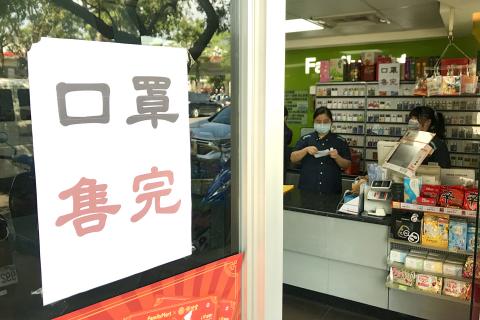The government plans to purchase 4 million masks a day to ensure continued supply and availability of masks during heightened alert over the spread of the 2019 novel coronavirus (2019-nCoV), Executive Yuan spokeswoman Kolas Yotaka said yesterday.
The Centers for Disease Control (CDC) on Tuesday announced that it would be releasing 6 million masks a day onto the market for three consecutive days.
However, that measure was insufficient, as there was still a shortage of masks yesterday.

Photo: CNA
The Ministry of Health and Welfare yesterday said that between Wednesday last week and Wednesday, more than 19.7 million masks were distributed to the nation’s four major convenience store chains, as well as pharmacies.
In addition to purchasing 4 million masks a day, the Ministry of Economic Affairs would also be supplying health ministry staff with masks, Kolas said.
The government has imposed a standard price on masks — NT$8 (US$0.26) per pack of three — to prevent stores or individuals from driving up prices, Kolas added.
The economics ministry is also investigating ways to step up the production of masks from 4 million to 6 million a day, she said.
Deputy Minister of Health and Welfare Ho Chi-kung (何啟功) said that the ministry is monitoring the number of mask sales.
“Continued difficulty in obtaining masks could lead to the ministry establishing a logistics platform and a task force,” Ho said.
Meanwhile, the Consumer Protection Committee warned that anyone found guilty of driving up the prices of masks could face a fine or be subject to imprisonment.
Citing Article 251 of the Criminal Code, the committee said that intentionally inflating the price or stockpiling masks could be penalized with up to three years of imprisonment, as well as a NT$300,000 fine.
The practices could also contravene the Fair Trade Act (公平交易法), resulting in fines of NT$50,000 to NT$25 million, the committee said.
The committee is inspecting distributors of masks, to observe demand and whether there are any incidents of prices being inflated.
Additional reporting by CNA

MAKING WAVES: China’s maritime militia could become a nontraditional threat in war, clogging up shipping lanes to prevent US or Japanese intervention, a report said About 1,900 Chinese ships flying flags of convenience and fishing vessels that participated in China’s military exercises around Taiwan last month and in January last year have been listed for monitoring, Coast Guard Administration (CGA) Deputy Director-General Hsieh Ching-chin (謝慶欽) said yesterday. Following amendments to the Commercial Port Act (商港法) and the Law of Ships (船舶法) last month, the CGA can designate possible berthing areas or deny ports of call for vessels suspected of loitering around areas where undersea cables can be accessed, Oceans Affairs Council Minister Kuan Bi-ling (管碧玲) said. The list of suspected ships, originally 300, had risen to about

DAREDEVIL: Honnold said it had always been a dream of his to climb Taipei 101, while a Netflix producer said the skyscraper was ‘a real icon of this country’ US climber Alex Honnold yesterday took on Taiwan’s tallest building, becoming the first person to scale Taipei 101 without a rope, harness or safety net. Hundreds of spectators gathered at the base of the 101-story skyscraper to watch Honnold, 40, embark on his daredevil feat, which was also broadcast live on Netflix. Dressed in a red T-shirt and yellow custom-made climbing shoes, Honnold swiftly moved up the southeast face of the glass and steel building. At one point, he stepped onto a platform midway up to wave down at fans and onlookers who were taking photos. People watching from inside

Japan’s strategic alliance with the US would collapse if Tokyo were to turn away from a conflict in Taiwan, Japanese Prime Minister Sanae Takaichi said yesterday, but distanced herself from previous comments that suggested a possible military response in such an event. Takaichi expressed her latest views on a nationally broadcast TV program late on Monday, where an opposition party leader criticized her for igniting tensions with China with the earlier remarks. Ties between Japan and China have sunk to the worst level in years after Takaichi said in November that a hypothetical Chinese attack on Taiwan could bring about a Japanese

STREAMLINED: The dedicated funding would allow the US to transfer equipment to Taiwan when needed and order upgraded replacements for stockpiles, a source said The US House of Representatives on Thursday passed a defense appropriations bill totaling US$838.7 billion, of which US$1 billion is to be allocated to reinforcing security cooperation with Taiwan and US$150 million to replace defense articles provided to the nation. These are part of the Consolidated Appropriation Act, which the US House yesterday passed with 341 votes in favor and 88 against. The act must be passed by the US Senate before Friday next week to avoid another government shutdown. The US House Committee on Appropriations on Monday unveiled the act, saying that it allocates US$1 billion for the Taiwan Security Cooperation Initiative